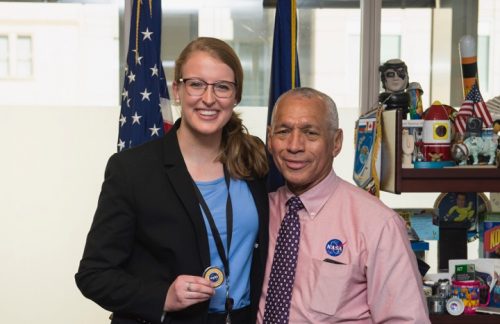Early in the morning, she trains for marathons to raise funds for Camp Kesem, a summer camp that supports children whose parents have cancer. Then she goes to work at the NASA headquarters in Washington, D.C., drafting international space agreements and briefing NASA officials before meetings with foreign nationals. In the evenings, she works on astronomy research. It does not sound like the typical routine of a Yale undergraduate, but this is what Katie Melbourne SY’19 has been doing since January as a Desk Office Support Intern at the NASA Office of International and Interagency Relations.
Melbourne was born in Los Angeles, CA, but she she grew up in Iowa, leading to some of her fellow Yale Precision March Band teammates calling her a traitor to her home. When she was ten, she attended a science summer camp, where she fell in love with astronomy. As a high school student, she took AP Biology and Chemistry, after which she started teaching herself physics through online courses.
Coming to Yale as an Astrophysics major, Melbourne soon decided to switch to Physics because of the broader array of skills that the major allowed her to develop, while still nurturing her love for astronomy. When asked what her main support system as a Physics major at Yale is, she does not hesitate to talk about Yale Women in Physics.“It has made a big difference to see women in physics in all stages of their careers, from my peers to upperclassmen, as well as grad students and professors,” said Melbourne. She first became involved with the group as a freshman, when she attended the American Physical Society Conference for Undergraduate Women in Physics. For Melbourne, it was eye-opening to hear stories of women from different backgrounds and to see the diverse array of research projects with which other female physicists were involved. Now, as a sophomore, she is Secretary General for Yale Women in Physics.
Melbourne has also been involved in research since last summer, when she worked at an observatory in Chile under the funding of the Tetelman Fellowship for International Research in the Sciences. Her project entailed reducing stellar activity noise in data for exoplanet detection. Next summer, she intends to work for Yale Physics Professor Reina Maruyama.
Upon her return to Yale, she plans to continue studying physics to develop her technical skills while taking writing and communication classes to develop her skills for policy. Scientifically guided expertise in policymaking can only serve to advance the effectiveness of legislation. In this respect, Melbourne is certainly already making a difference.

